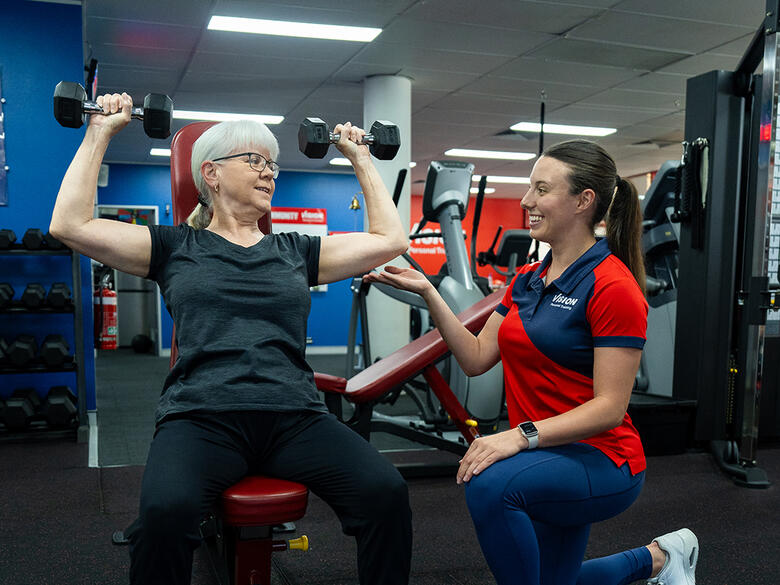Menopause is a natural biological process marking the end of a woman's reproductive years, typically occurring between ages 45 and 55. During this time, hormone levels—especially estrogen—fluctuate and decline, often causing symptoms like hot flashes, changes in mood, muscle and bone density loss. Eating well during menopause is crucial because a balanced diet supports hormonal balance, helps manage weight, helps to maintain muscle, strengthens bones, and reduces the risk of chronic conditions like heart disease and osteoporosis. Nutrient-rich foods can also ease symptoms and promote overall well-being during this transitional phase.
Prioritise Protein
Muscle mass naturally declines with age, and this loss accelerates with lower estrogen. Eating 1.2–1.6g of protein per kg of body weight per day helps preserve muscle, supports metabolism, and keeps you full longer - key for managing weight and energy.
Focus on Nutrient-Dense Foods
With your calorie needs dropping, every bite matters. Choose foods rich in:
• Calcium & Vitamin D – Support bone strength
• Magnesium – Aids sleep, nerve health, and mood
• B vitamins & Iron – Boost energy and brain function
• Omega-3s – Reduce inflammation and may ease hot flashes
• Fiber – Keeps digestion regular and blood sugar stable
Whole foods should be the foundation: colourful vegetables, whole grains, legumes, nuts, seeds, lean proteins, and healthy fats.
Gut Health: The New Frontier in Menopause Wellness
Emerging research shows that estrogen affects your gut microbiome, and vice versa. A disrupted gut can worsen inflammation, digestion, and even mood.
To support gut health:
• Include fermented foods: yogurt, kefir, kimchi, sauerkraut
• Eat prebiotic fibers: onions, garlic, leeks, bananas, oats
• Reduce processed food and excess sugar
A healthy gut improves nutrient absorption and may help stabilise mood swings and support hormonal balance.
Sleep and Recovery: Underrated but Essential
Sleep problems are one of the top complaints during menopause. Night sweats, anxiety, and hormonal shifts can lead to broken sleep and fatigue.
To support better sleep:
• Avoid caffeine late in the day - as it can stay in your system for hours
• Minimise alcohol - it disrupts deep sleep
• Include magnesium rich foods (like leafy greens and pumpkin seeds)
• Create a calming nighttime routine (dim lights, no screens, wind down)
• Try low-intensity evening exercise like walking or stretching
Sleep isn't just about feeling rested—it's when your body resets hormones, repairs tissue, and balances appetite-regulating hormones like leptin and ghrelin.
Exercise: Non-Negotiable for Health and Symptom Control
Strength Training Is a Must. Weight training 2–3x per week can:
• Preserve or build muscle
• Increase bone density (critical during and after menopause)
• Improve insulin sensitivity and metabolism
• Boost mood and confidence
This doesn’t mean heavy bodybuilding. Bodyweight, resistance bands, or dumbbells are all effective.
Cardio for Heart and Hormones
With estrogen's heart-protective effects declining, regular cardio helps reduce cardiovascular risk and improves endurance, energy, and emotional health.
• Aim for at least 150 minutes/week of moderate-intensity activity
• Mix in intervals or brisk walks to add variety
Movement Helps Manage Menopause Symptoms
Regular movement reduces:
• Hot flashes
• Brain fog
• Anxiety and low mood
• Sleep problems
Even daily walks or yoga can make a big difference.
Stress and Cortisol: The Hidden Weight Gain Factor
Stress hormones like cortisol often rise during menopause, and high cortisol levels are linked to increased belly fat and insulin resistance. Chronic stress can also worsen sleep, cravings, and inflammation.
Support stress management with:
• Mindfulness and breathwork
• Yoga or gentle movement
• Outdoor walks in nature
• Adequate sleep and balanced meals
You don’t need to "hustle" through menopause - your body responds better to consistency and recovery.
Supplements: What Helps vs. What’s Just Hype
Some women benefit from targeted supplements, but it's important to know which ones are evidence-backed.
Helpful (with guidance):
• Vitamin D & Calcium – Bone support
• Magnesium – Sleep, mood, and muscle relaxation
• Omega-3s – Inflammation and brain health
• Collagen – May help with skin, joints, and connective tissue
• Creatine Monohydrate - Helps counter age related declines in muscle tissue and bone mass
Supplements should fill gaps, not replace a nutrient-dense diet. Always check with a healthcare provider before adding anything new.
Body Image and Self-Compassion in Menopause
Weight gain and physical changes during menopause are common - but the stigma around them adds unnecessary pressure. Instead of chasing extreme fixes, focus on strength, energy, and well-being. Building a positive relationship with your body through this transition matters just as much as macros or workout routines.
Final Takeaway
Menopause is a shift - but it’s not a decline. With smart nutrition, consistent movement, sleep, and stress care, you can manage symptoms and feel strong in your body. It’s not about being perfect it’s about being proactive.
Your body is changing, but you are still in control.
Are you ready to stop chasing perfection and start making real progress?
A truly personalised training approach with Vision
With personalised one-on-one training, your trainer will design a program to suit you, and only you. Your trainer will consider your current condition, time frame, body shape, exercise preferences and general lifestyle to tailor a training program that will help you achieve your fitness and weight loss goals. Your trainer will also guide you through a mix of cardio and weight training to get the balance just right.

